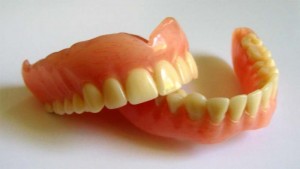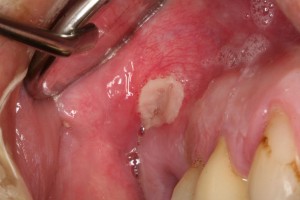As one gets older in life, you tend to be losing teeth along the way because of tooth decay, gum diseases or trauma. While preservation of teeth for as long as possible may be desirable, it may create greater problems if extractions of teeth have to be postponed till later in life.
Dentures or fake teeth are intended to restore function of your mouth but sometimes they can be responsible for many common lesions found in the mouth including gum sores from dentures. The lesions tend to occur in greater frequency in removable dentures (complete or partial dentures) compared to permanent dentures (bridge or implants) as removable dentures can be distorted or broken with use.
Problems affecting denture-wearers
Though eating and chewing with dentures is less efficient than with healthy teeth, this seems to matter little as you take time to adapt, and most denture-wearers suffer no more than discomfort or social embarrassment from time to time. Other troubles affecting the denture wearer may be due to faults in the denture itself or to some conditions underlying it.
Causes of discomfort or pain relating to dentures may include:
- Traumatic ulcers or mouth sores
- Epulis fissuratum or Denture hyperplasia
- Denture stomatitis
- Angular cheilitis
- Papillary hyperplasia of palate
- Frictional keratosis and other hyperkeratotic lesions
- Buried teeth, roots or odontomas
- Cysts
- Paget’s disease
- Fracture of the jaws
- Cancer
What are gum sores from denture?
Gum sores or also known as traumatic ulcers (denture sore spots) are usually caused by a denture and often seen in the areas where the denture retains.
Causes of gum sores from dentures
Unstable or unretentive dentures can lead to tissue irritation or ulceration in the mouth due to excessive movement of denture. The sore on gums can be caused by overextended denture, bone spicules (small pointed structures) under the denture or by food trapped between the mouth tissues and the denture. Gum sores are tender, have a yellowish floor and red margins with no hardening or thickening of mouth tissues.
If caused by the sharp edge of a broken-down tooth, traumatic ulcers are usually on the tongue or inner cheek surface.
Denture problems that can cause pain
- Overextension of the denture periphery
- Poor denture fit
- Inadequate relief of sensitive areas on the palate
- Incorrect recording of occlusion or bite
- Incorrect positioning of the fake teeth
- Irregular loss of bone on the retention ridge in the mouth
- Allergy to denture base material, usually made from acrylic
- Infection with yeast Candida albicans
- Undercuts on the denture surface
Predisposing factors to gum sores
- Diabetes mellitus
- Nutritional deficiencies
- Xerostomia or dry mouth
- Radiation therapy
Treatment of gum sores
You will have to bring your ill-fitting denture back to your dentist to find the cause of the sore in gums. Corrections to the denture will be made for a better adaptation in the mouth. Traumatic ulcers heal promptly a few days after elimination of the cause. If they persist for more than 7 to 10 days, or there is any other cause for suspicion as to the cause, biopsy should be carried out.
Denture adhesives should not be used by those with ill-fitting dentures, worn out dentures or those prone to overuse the adhesives. They are also not meant for those with medication-induced xerostomia, physical inability to clean their dentures and those who are allergic to the contents of the adhesives (usually towards karaya, a vegetable additive). Furthermore, denture adhesives are not substitutes for a reliner or tissue conditioner so visit your dentist if you need to readjust your denture.
How to prevent gum sores from dentures
If you find your new or old dentures uncomfortable or not fitting as well as it should be, you should bring them back to your dentist to get whatever errors on the dentures corrected or get a new denture made.
Ill-fitting dentures can arise from lack of communication between you and your dentist during the denture making process or from an inexperienced dentist so make sure you follow up with your dentist a week after you get your new dentures for a review to prevent any future discomfort.
Dentures, no matter old or new, should be checked once a year by your dentist. Be forewarned that self denture repair, reline or adjustments can harm your denture or soft tissues in your mouth. Therefore it is advised to occasionally service or readjust your denture at your dentist for there can be normal physiological changes in your supporting bone and tissues, for example increased movement of teeth and accelerating bone loss.


